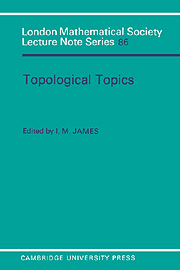 Topological Topics
Topological Topics Published online by Cambridge University Press: 07 December 2009
Peter Hilton has published more than 250 articles and books? about 70 or 80 of them may be said to be of an algebraic nature. To give a description of the content of these papers in a few minutes is an impossible task. I shall therefore concentrate in this talk on a few aspects of Hilton's papers on algebra and try to describe the main ideas and the main results. I will not say anything about the numerous books and lecture notes Peter Hilton has written on various algebraic topics, although they undoubtedly constitute an equally important and influential part of his work. Many of the papers I shall be concerned with have one or sometimes two coauthors. Indeed, those who have had the chance to work with Peter Hilton know that he has an exceptional ability to stimulate and generate joint work.
For those who know Peter Hilton it is no surprise that most of his papers on algebra have a close relationship to algebraic topology? indeed either the motivation for the paper or the applications or even both lie in topology. Thus this part of his work can only be described in relation to topology and the assignment of a paper to algebra or topology is often arbitrary.
The first topic I want to talk about in some detail, the homotopy theory of modules, illustrates this point very clearly. The basic idea leading up to the theory was conceived in Zurich in 1955. Hilton, in his retrospective essay on duality in homotopy theory [H242], relates the story.
To save this book to your Kindle, first ensure no-reply@cambridge.org is added to your Approved Personal Document E-mail List under your Personal Document Settings on the Manage Your Content and Devices page of your Amazon account. Then enter the ‘name’ part of your Kindle email address below. Find out more about saving to your Kindle.
Note you can select to save to either the @free.kindle.com or @kindle.com variations. ‘@free.kindle.com’ emails are free but can only be saved to your device when it is connected to wi-fi. ‘@kindle.com’ emails can be delivered even when you are not connected to wi-fi, but note that service fees apply.
Find out more about the Kindle Personal Document Service.
To save content items to your account, please confirm that you agree to abide by our usage policies. If this is the first time you use this feature, you will be asked to authorise Cambridge Core to connect with your account. Find out more about saving content to Dropbox.
To save content items to your account, please confirm that you agree to abide by our usage policies. If this is the first time you use this feature, you will be asked to authorise Cambridge Core to connect with your account. Find out more about saving content to Google Drive.